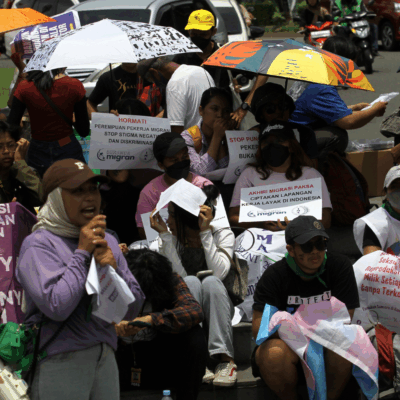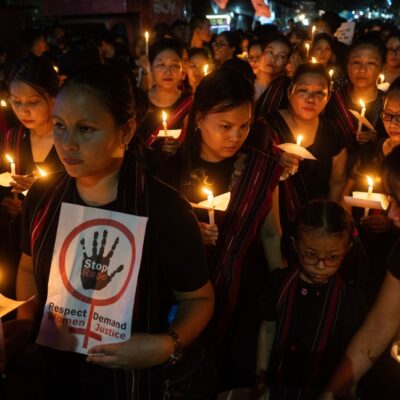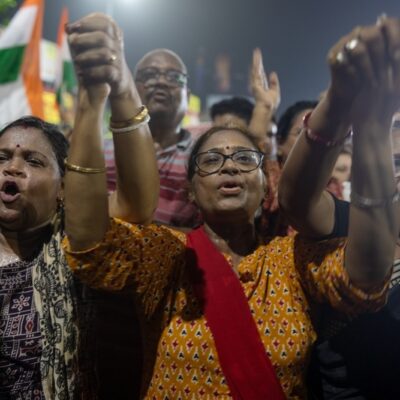Since the 2021 military coup in Myanmar, incidents of gender-based violence have emerged within the communities of political exiles who have fled over the border to Thailand.
On February 1, 2021, Myanmar’s military (Tatmadaw) launched a coup. President Win Myint and State Counsellor Aung San Suu Kyi of the National League for Democracy were detained and mass protests soon erupted. The Civil Disobedience Movement and the armed resistance group, People’s Defense Force, emerged as part of what has come to be known as ‘the Spring Revolution’.
The military arrested and brought criminal charges against political activists, subjecting many to torture and extrajudicial killings. In response, thousands of individuals, along with their family and partners, fled across the Thai-Myanmar border to seek safety.
Myanmar exiles use limited legal tools originally designed for undocumented labour migrants to obtain permission to stay in Thailand under carefully defined conditions, often referred to as forms of ‘partial citizenship’. Nevertheless, they are vulnerable to risks such as deportation, fines, and detention.
The reproduction of gender-based violence
Gender-based violence is widespread in Myanmar, stemming from a male-dominated culture that draws legitimacy from religious interpretations and the militarised social order. Although Myanmar’s Penal Code criminalises rape, sexual abuse, and sexual relations with minors, the country lacks comprehensive constitutional or legislative frameworks to address violence against women and girls and perpetrators often go unpunished.
Decades of military rule have reinforced patriarchal norms and male-dominated institutions. The Protection and Prevention of Violence Against Women (PoVAW) bill, originally drafted in 2013, remains stalled in Myanmar’s parliament. These patterns have created a climate for exiles that manifests in gender-based violence, even as they reside outside the legal jurisdiction of Myanmar.
Violence in the exiled community
In June and July 2024, I interviewed two women exiles from Myanmar affected by gender-based violence, as part of my more general research into the exile community.
One interviewee was a woman who alleges her daughter was raped while they were living in a house with other Myanmar exiles, including the alleged perpetrator.
She states that after the coup, “I participated in strikes and protests, which led to disciplinary action and my subsequent dismissal from my [senior position]. Due to political instability and threats to my safety, I moved to [Thailand] with my daughter. We began living with other exiles in a shared house, where my daughter was sexually assaulted.”
In seeking justice for her daughter, she encountered language barriers, legal constraints, and social stigma—including victim-blaming by supporters of the alleged perpetrator—and negative perceptions among local residents. Although she mobilised various forms of transnational support—from acquaintances, religious networks, international agencies, civil society organisations, and authorities in both Myanmar and Thailand—the case remains unresolved. The alleged perpetrator’s whereabouts are unknown and Thai authorities have been unable to proceed with any legal action.
She stated that there have “been instances of solidarity extended toward the perpetrator, and some [supporters of the perpetrator] have accused us of betraying the revolution. Nevertheless, I believe that true justice must be ensured for the revolution to succeed, and I remain determined to continue fighting for justice for the sake of future generations.” She emphasised that confronting gender-based violence was inseparable from her more general commitment to justice and democracy.
The second interviewee was a journalist who has reported for approximately 10 years on gender, human rights and women’s issues. She stated that “within the community of political exiles, there have been cases in which male members committed gang rape or forced young women into marriage through sexual violence. I myself also experienced verbal sexual harassment from men within the community.”
She has reported extensively on the case of a woman from Myanmar who died in April 2024 from injuries allegedly inflected by her husband, who was a member of Myanmar’s People’s Defence Force, which opposes the military.
She states that “during the investigation, some members of the exile community opposed disclosing the incident, and I was criticised by others for pursuing it.” However, the journalist indicated she remains committed to helping seek justice for victims of gender-based violence.
Legal change is needed
Because many Myanmar exiles in Thailand are undocumented, responding swiftly—or at all—to gender-based violence is difficult, and survivors often struggle to access protective services.
Further, there is a prevailing sentiment among the exiled community that the individual suffering of exiled woman and girls must be endured for the greater cause of political resistance to the military coup. In the tight-knit exile community, revealing gendered violence can be interpreted as harming the revolutionary movement.
Thai authorities should explore implementing legal pathways that can stabilise the status of exiles in Thailand, enabling more effective support and legal protection. Thai authorities have acted in cases of spousal murder and child rape within the Myanmar exile community, made possible through collaboration with interlocutors, civil society organisations in Thailand, and gender-focused groups within the exile community.
Nevertheless, these cases illustrate both the risks faced by exiled Myanmar women and the importance of establishing more comprehensive and accessible legal mechanisms for their protection.
Eunjeong Lee is a PhD candidate at Seoul National University.
This article is part of a special mini-series published by Asialink’s Insights and the Asia Institute’s Melbourne Asia Review.




